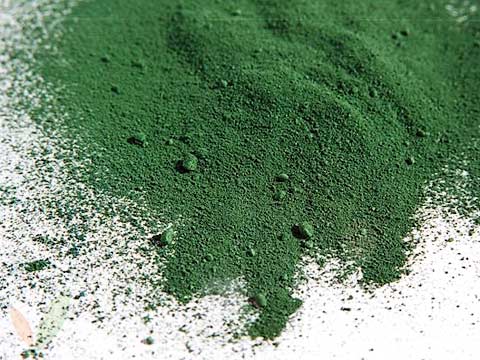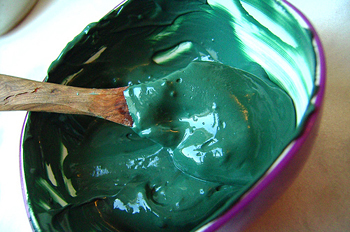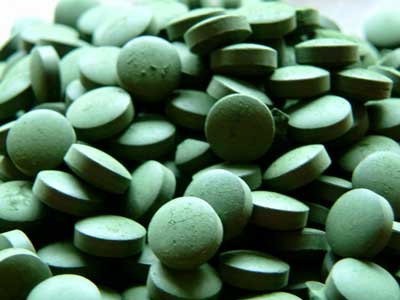Spirulina revitalizes you when you take it internally and is also good as a face mask!

Vitamins
Among food, Spirulina has a relative high provitamin A concentration. An excessive dose of b-carotene may be toxic, but when the b-carotene is ingested from the Spirulina or another vegetable it is usually harmless since the human organism only converts into vitamin A the quantity it needs. Spirulina is a very rich source in vitamin B12, and that is a reason why these Cyanobacteria are of great value for people needing supplements in the treatment of pernicious anemia.

Spirulina is packed with a number of important phytonutrients. The blue-green color of Spirulina comes from its high concentration of a phytonutrient called phycocyanin. For fear of putting you to sleep, we will not go into all the chemistry of phytonutrients, but the vast amount of phytonutrients in Spirulina helps explain the strong antioxidant and immune boosting benefits of Spirulina.
In fact, NASA has conducted studies on Spirulina as a potential food for space travel. When it comes to space travel, the goal is to provide the astronauts with foods that are in rich in nutrients but don’t take up much space. NASA found that 1 kg of Spirulina had the same nutrients found in about 1,000 kgs of “assorted vegetables”! Simply put, when you are feeding your body such a high concentration of healthy nutrients, good things will happen.
Beta Carotene
The beta carotene in spirulina is ten times more concentrated than that in carrots.
Protein
Spirulina is 60% protein, more than any other natural food. It contains all nine essential amino acids and only a few calories.
Rare Fatty Acid – Gamma-linolenic acid (GLA)
Spirulina is the only whole-food source of the rare fatty acid Gamma-linolenic acid (GLA). This greatly aids in reducing cholesterol, lowering blood pressure, easing pre-menstrual pain and reducing the symptoms of skin conditions such as eczema, psoriasis, dermatitis, dry scalp syndrome and more.
Iron
Spirulina is rich in iron, magnesium and trace minerals and is easier for the body to absorb than iron supplements. Iron is essential to the formation of red blood cells that carry oxygen to all parts of the body and is naturally associated with vitality and a healthy looking complexion.
This is one of the critical plant ingredients for proper skin nutrition that we need to clear up the many skin problems that exist today.
Vitamin B-12 and B Complex
One very important vitamin group essential in providing skin nutrients that spirulina contains is B Complex. These B vitamins are also especially important for healthy nerves and tissue as well as unusual phytonutrients for overall health and cleansing.
Spirulina’s dark color comes from a rainbow of natural pigments. They harvest sunlight at different wavelengths and protect from too much sun. These pigments offer unusual health benefits and help synthesize many enzymes necessary for regulating body metabolism. They are chlorophyll (green), carotenoids (yellow and orange) and phycocyanin (blue), the dominant color.

The natural plant pigments that give Spirulina its distinct color also provide numerous health benefits. These include chlorophyll (green), which helps cleanse the body of toxins, beta carotene (orange), a potent antioxidant, and phycocyanin (blue), which supports protein absorption and healthy immune function.
Another special ingredient of Spirulina is a gamma-linoleic acid, which can be found in only a few seeds and fruits. The other most widely known sources are evening primrose (oenothera) oil and breast milk. Gamma-linoleic acid is important to protect the integrity of skin cells and muscles, as it is an important ingredient in the formation of new cell membranes.
Facial masks based on spirulina prevent premature aging of the skin, improve its condition, contribute to preventing wrinkles, and help in the fight against acne.
